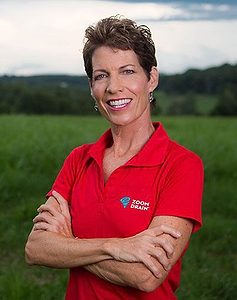Is It Time?
Succession planning, assisted living and other awkward life conversations.

Have you watched the TV show “Succession”? Patriarch Logan Roy announces his retirement from his billion-dollar media empire, then retakes the reins. His four complicated kids vie for his favor while constructing duplicitous alliances. Underlying the whole power play is the burning question, “Is Dad losing it?” as we see glimpses of Logan’s cognitive frailty. Strategic succession planning devolves into a hostile coup of the family business.
It’s must-see TV. And over-the-top dramatic. However, it may stir up some too-close-to-home feelings.
Maybe it’s time someone in leadership at your company steps down. Maybe your dad or mom. Maybe you. At some point, we all need a little help — with the business and, ultimately, with making it through the day.
Oh, these inevitable life moments lead to such awkward conversations. Let’s explore ways we can proactively and positively embrace the changing seasons of life, in the family business and at home.
Succession planning
Your business — the one you own or work for — will change ownership at some point. Is it time to make those changes?
Start succession planning with business planning. It’s less threatening and will get you where you need to go. Business planning is literally any activity that helps you clarify your vision and mission and take aligned action in that direction.
Use time together to introduce conversations about hopes and dreams. Windshield time, time cleaning the shop or stocking the truck — these moments can offer a nonthreatening way to bring up big-picture questions with family members. We have an expression in my family, “Everyone carries their own ski boots.” It’s a metaphor for being responsible for your stuff — literally and emotionally. Working in the family business is optional. Committing to your best life is encouraged, however that may take shape.
If you have team members who are not related but feel like family, be sure to involve them in private conversations about their opportunities. If you are a key employee and want to be involved in next-phase discussions, be sure to speak up. Don’t simmer in fear or resentment, or hope that someone else is planning your future.
Schedule a retreat to put together your business plan. I wrote a slim book called “The Weekend Biz Plan” that could be just what you need for your agenda. You can get a copy for free at www.ellenrohr.com/wbp-free. Discuss your mission and vision. Lay out the organizational chart for your current business and the next few years. Revisit your financial plan and marketing plan. Agree to time frames and shake hands on the agreed-upon goals and actions.
Gulp. This can get sticky. Center yourself in love. Keep the emotions in check by using data to make decisions. You may want to enlist the help of a family therapist or business coach to moderate your conversations.
Talk to a succession planning lawyer after you have these conversations. Don’t waste time and money until you and your family have a clear idea of the next steps. An experienced lawyer can help you with the logistics.
As you address changes at work, you may also bump into current or impending challenges at home. Is it time for someone in your family to get help for day-to-day living?
Assisted living
It’s best to be pro-active. The older we get, the less time we have. Your choices are limited when there is a health crisis.
When is it time? Are you or a family member:
- •Having difficulty managing activities of daily living (ADLs)? These would be basic grooming, housekeeping, cooking tasks.
- Losing interested in caring for the house or yard?
- Living in a small portion of the house?
- Gaining or losing significant body weight?
- Letting mail pile up and bills go unpaid?
- Neglecting plants and pets?
- Not going out for errands or meeting friends?
Ask open-ended questions such as, “What do you want to do?” and “Where would you like to spend the next three years of your life?” Don’t go all Bossy Pants. So many older women I know feel as if every decision was made for them. Open the discussions and give each other time to work through options.
Is it time to move to an assisted-care facility? Nursing home is a rough term. Assisted living is the new buzzword. Also, look into retirement-style living or an over-55 community.
If staying at home is the goal, what would it take to feel safer and happier? Support from family members? Options for home health care? A landscaper or housekeeper? Services provided by local senior centers or government agencies?
Crunch the numbers. Assisted-living costs average from $2,000 to $5,000 per month and go up as care requirements increase. Yikes.
These communities have salespeople who can help you through the process. Note that they may go heavy on the deluxe packages. Ask to speak to a social worker if you feel overwhelmed.
Look into long-term care money for veterans and spouses.
What about selling the home? Reverse mortgage? Again, being pro-active helps by giving you more time to explore options.
Consider that your parents’ stuff is not your stuff. This is doubly true when they are still alive! Be willing to not fuss over the family china. Does it matter? Is the family fortune considerable? Be OK with your parents’ decisions, no matter how unjust it seems. Get professional help if you and your siblings are in danger of ruining your relationships.
Have the awkward conversations about power of attorney, DNRs, living wills and estate planning. Ask friends and business contacts for good professional referrals — and spend some time on Google.
Look into long-term health insurance for yourself. Let your kids know that, in lieu of an inheritance, you will set aside enough money to care for your end-of-life needs. Update your will and keep a running list of your end-of-life wishes.
Sigh. It’s tough. We are going to get old and ultimately die. Be willing to talk about life and death. These sensitive, emotional and awkward conversations can lead to deeper relationships and spirituality.
My mom — we call her Yai Yai — has lived with us for the last 21 years. She and my dad moved out when he retired and was showing some symptoms of dementia. We fixed up one of the barns on our property and created a lovely home for them. My dad died about 10 years ago. Yai Yai is healthy and sociable and sharp as a tack. It’s just been in the last few months that she resigned from her volunteer positions at the art museum and the hospital. She started using a cane to get around.
A few months ago, Yai Yai announced she wanted to move to assisted living. One of my sisters lives in Ocean City, N.J., a delightful resort shore town where we spent most of our summers growing up. There is an assisted-living community just a few blocks from her.
At first, I was sad and felt a little guilty. Were we not doing enough for her to feel happy and fulfilled here? You know, it’s just time. Yai Yai wanted to be in control of the decision. At almost 90 years old, she knows she is one health issue away from being in a much different position to make life choices. Yai Yai just moved to The Shores in Ocean City and is loving it! And we are all breathing a little easier.
“If there is any responsibility in the cycle of life, it must be that one generation owes to the next that strength by which it can come to face ultimate concerns in its own way.” — Erik Erikson
For more information on these topics, visit these websites:
- Wikipedia, “Succession” TV series, https://bit.ly/2TkRlcF
- “The Small Business Owner’s Guide to Succession Planning,” https://bit.ly/2yRd5DA
- “How to Talk to Your Parents about Assisted Living,” https://bit.ly/2YWIeA7
- "End-of-Life Care, Not End-of-Life Spending,” https://bit.ly/2LsfgCn





